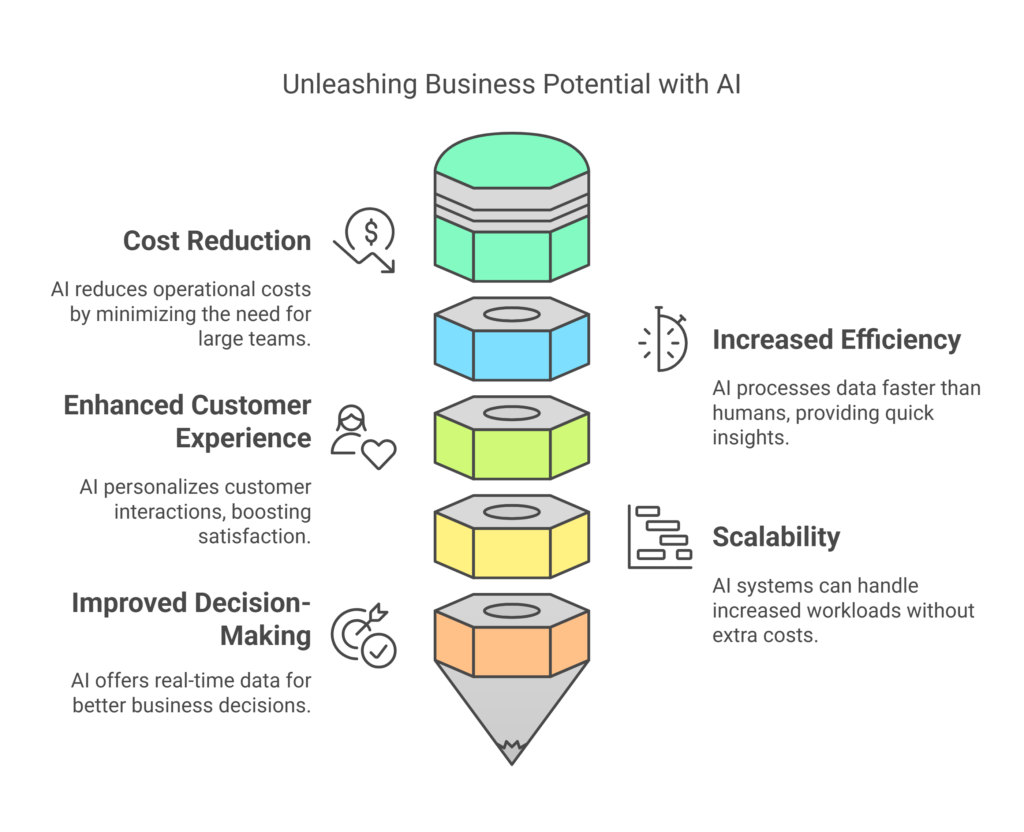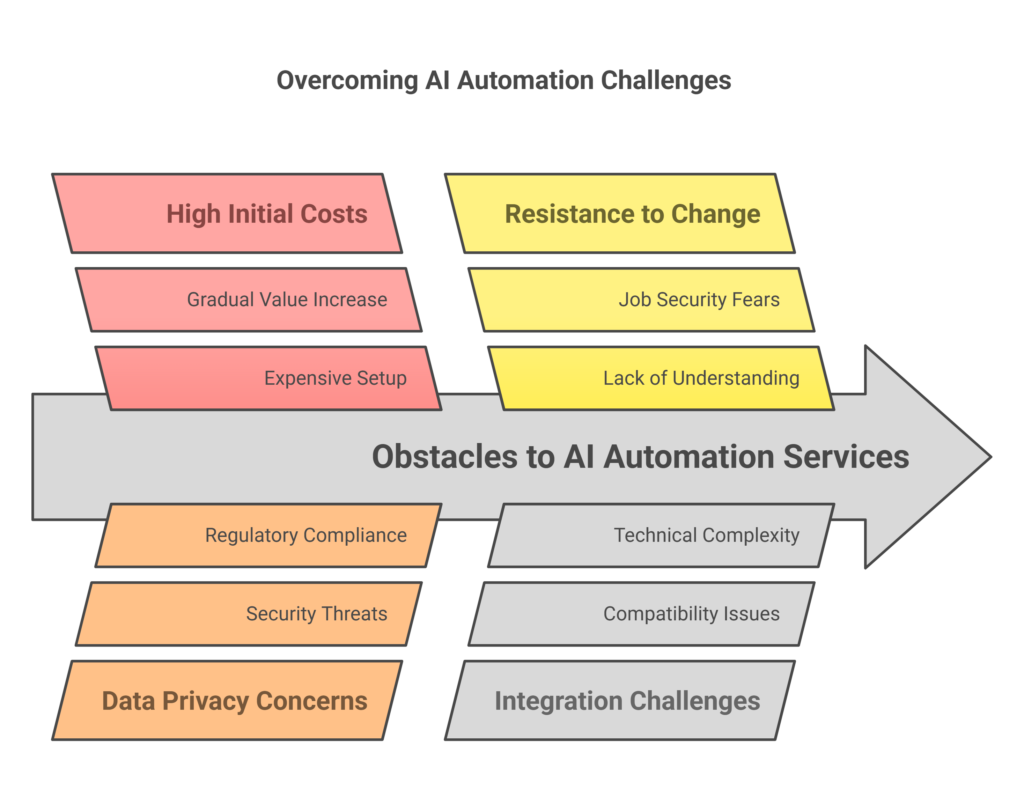Did you know that adopters of Ai Automation Services anticipate a significant improvement in operational performance? With the technological boom, all businesses are searching for a way to automate processes, control expenditures and elevate customer satisfaction indexes. These are AI automation services. In this detailed guide, we will look deeper into what AI automation services are, pros and cons, and how to implement them in your business. Ultimately, you’ll appreciate how AI automation can transform your operation and boost growth.
AI automation services are designed to perform preset tasks, streamline repetitive tasks, enhance workflow and decision making processes using intelligent systems. These systems consist of a combination of RPA, machine learning and natural language processing. AI automation services significantly reduce the demand for human resources and input to operate.
AI automation does everything nowadays. From forecasting market changes, managing stocks, analyzing data, to even answering customer complaints. AI is doing so many of these mundane tasks that it leaves businesses with ample amounts of time to allocate towards decision making.
Benefits of AI Automation Services

With the rise of AI, businesses of all sizes are now able to expand their horizons without worrying about labor too much. In fact, here are some advantages about AI automation:
Cost Reduction
AI is proving to be cost effective as it provides businesses ways to save and allocate their finances better. Tasks such as customer queries which can be handled by AI chat bots save a business from having to maintain an entire customer support team.
Increased Efficiency
Manpower also spends a lot of time and power gathering insights from data. The entire process can take days, all while AI can do it within seconds. Powerful algorithms process data and allows AI to manifest actionable insights.
Enhanced Customer Experience
AI has completely altered customer experiences, and in a better way. By analyzing browser history, engagement and satisfaction has soared due to AI powered recommendation engines suggesting personalized products and services.
Scalability
Automation services powered by AI enable businesses to scale their operations and do more work without incurring additional expenses. It does not matter if you are completing 100 or 10,000 orders; AI systems are equipped to handle the workload satisfactorily.
Improved Decision-Making
AI-powered automation offers businesses data and analytics in real-time which enhances their decision-making processes. A good illustration is that predictive analytics can aid enterprises in determining demand, setting optimal prices, and mitigating risk.
Problem related to AI Automation Services
Despite the variety of advantages, there are certain hindrances that need to be dealt with. An outline of the common obstacles along with ways to solve them are provided below.
High Initial Costs
The setup of AI automation services may not be cheap. But as time goes on, the losses tend to diminish and the value add significantly increases.
Solution: Deploy automation on a single process to gain initial validation and then broaden the scope from there.
Data Privacy Concerns
The use of vast amounts of data makes the AI systems vulnerable to a variety of security and privacy threats.
Solution: Stay within the bounds of regulatory guidelines, monitor security policies, and ensure data privacy gel with the standards.
Resistance to Change
Employees can be reserved when it comes to accepting AI automation fearing that it may rob them of their jobs or because they do not fully understand it.
AI Automation Services: Changing the Way Companies Operate Using Cognitive Solutions
4 Challeenges of Integration
Integrating existing systems with AI automation services can be a daunting task.
Work with competent AI service vendors for hassle free integration and support. Approach: The Problems Solving.
AI automation is at present being employed in the transformation of various industries over the globe. A few of these include:
- Businesses Steps for putting AI Automation into Use
- Are you ready to take a leap into AI automation? Here a few practical steps on how to start:
- Identify Pain Points: Identify processes that drag on for a long time, create errors, or incur additional costs.
- Set Clear Goals: Supporting costs and maximizing business satisfaction can be an objective.
- Choose the Right Tools: Review the AI automation services that suit your business objectives and expect positive feedback from the vendors.
- Start Small: As a test case, implement an AI module at any one place and observe its effectiveness.
- Monitor and Optimize: Performance of AI systems should be regularly reviewed to enable control adjustments of the system.
- Train Your Team: Employees ought to be trained on how to utilize AI powered tools properly.
- Scale Up: Moving forward, once satisfactory results are obtained gain, implement AI automation for other applicable areas of the business.

How AI Automation is Transforming Industries: Real-World Examples in Action
Are you curious about how Artificial Intelligence (AI) is impacting the business world today? It’s no longer a thing of the future – AI automation is now a critical tool for businesses of all sizes. From enhancing customer service to streamlining manufacturing, AI is quietly revolutionizing how companies operate. This post will dive into real-world examples of how AI automation services are making businesses more efficient, productive, and customer-centric. Prepare to see AI’s practical applications in industries you interact with every day.
Automation Revolutionizing Customer Service & Support
Customer service is often the frontline of any business, and AI is stepping up to transform how these interactions happen. Here are a few ways AI automation is creating smarter, faster customer experiences:
Example 1: AI-Powered Chatbots for Retail (E-commerchttps://www.chatbotbuilder.ai/featuree & Brick-and-Mortar)
Description: Retailers are deploying AI chatbots not just on their websites and apps, but also via in-store kiosks and even messaging platforms. These chatbots handle a range of customer inquiries: order tracking, returns, detailed product information, appointment bookings, and even personalized recommendations based on past purchases. Think about how seamlessly you can now find a specific item or check inventory.
Impact: Reduced wait times (no more frustrating hold music!), lower labor costs as the bots handle basic tasks, and human agents can focus on more complex issues that need a personal touch.
Highlight: The difference between a frustrating wait on hold and the instant gratification of a chatbot providing information in seconds. This means more satisfied customers and more efficient support teams.
Example 2: AI Automation in Content Creation & Marketing
Content and marketing are the lifeblood of business growth, and AI is transforming how these are created and managed. Here are a few key applications:
- Automated Content Generation for News Outlets & Blogs (Media) – Extended:
- AI is becoming a go-to for generating news reports on routine events (e.g., sports scores, financial summaries, weather reports), crafting compelling product descriptions, writing basic blog posts from structured data, and even generating variations of ad copy for A/B testing. It is being used to speed up content creation across various formats.
- Impact: Increased content output, reduced production costs, and allows journalists and writers to concentrate on in-depth investigations, creative storytelling, and high-value content. This means quicker news cycles and increased content marketing effectiveness.
- AI-Powered Ad Campaign Optimization (Advertising & Marketing)
- Description: AI algorithms dive deep into campaign data (clicks, conversions, user engagement), identifying patterns and making automatic adjustments to bids, targeting, and even the creative elements of the ad. This happens in real-time, and the goal is to maximize return on investment.
- Impact: Improved ad campaign effectiveness, reduced ad spend waste, and greater overall returns on marketing investments. It also means fewer marketing mistakes and data-driven campaign decisions.

(Example 3: AI-Powered Quality Control (Manufacturing & Food Processing) :
- Description: AI-powered vision systems are used to inspect products on the assembly line, identifying even minute defects and inconsistencies faster and more accurately than human inspectors. This is true for everything from electronic components to food packaging.
- Impact: Reduced waste, improved product quality, and faster production throughput. This results in higher customer satisfaction and reduced operational costs.
AI Automation in Finance & Legal
AI is bringing accuracy, security, and efficiency to the finance and legal industries. Here’s how:
- Fraud Detection and Prevention (Banking & Finance)
- Description: AI algorithms analyze financial transactions in real-time, detecting suspicious patterns that could signal fraudulent activity, like unusual credit card charges, identity theft, and money laundering attempts. These systems are trained to learn from massive amounts of data to identify and flag abnormal activities.
- Impact: Reduced financial losses, enhanced security for both the institution and its customers, and a greater overall level of customer trust.
- .
- Contract Analysis & Review (Legal)
- Description: AI tools quickly analyze vast volumes of contracts, extracting key clauses, identifying potential risks, and ensuring compliance. This helps lawyers and legal teams work more efficiently and quickly.
- Impact: Reduced legal review time, improved accuracy, and lower overall costs associated with managing legal documents. AI is helping to free up lawyers to focus on complex legal strategy.
- Highlight: The huge time and effort savings AI offers when analyzing long, complex legal documents, reducing human error and speeding up critical legal processes.
The examples we’ve explored here represent just the tip of the iceberg when it comes to the potential of AI automation services. These practical applications are not only transforming how businesses operate but also reshaping how we all interact with them. From faster customer service to more efficient manufacturing, AI is enhancing processes, boosting productivity, and offering a competitive advantage. Are you ready to see how AI can impact your business? We invite you to learn more and discover how AI automation can drive your success.
Conclusion
AI automation services are now not a luxury—they’re a necessity for companies trying to thrive in the virtual age. From value reduction and improved performance to stronger customer experiences, the advantages of AI automation are plain. While challenges exist, they may be conquer with careful planning and execution.
Ready to transform your commercial enterprise with AI automation? Start by way of identifying one place in which automation could make a distinction and take the first step towards a wiser, extra green destiny. Share your thoughts and stories with AI automation in the comments beneath—we’d like to listen from you!
Frequently Asked Questions
1. What are AI automation services?
AI automation services use intelligent systems like RPA (Robotic Process Automation), machine learning, and natural language processing to automate repetitive tasks, streamline workflows, and enhance decision-making processes. These services reduce the need for human intervention while improving efficiency and accuracy.
2. What are the key benefits of AI automation services?
- Cost Reduction: Automates tasks like customer support, reducing labor costs.
- Increased Efficiency: Processes data and generates insights in seconds.
- Enhanced Customer Experience: Personalizes recommendations and improves engagement.
- Scalability: Handles increased workloads without additional expenses.
- Improved Decision-Making: Provides real-time analytics for better business decisions.
3. What industries can benefit from AI automation?
AI automation is transforming industries like:
- Retail (inventory management, personalized marketing)
- Healthcare (patient data analysis, appointment scheduling)
- Finance (fraud detection, risk assessment)
- Manufacturing (predictive maintenance, supply chain optimization)
- Customer service (chatbots, voice assistants)
4. What are the challenges of implementing AI automation?
- High Initial Costs: Setting up AI systems can be expensive.
- Data Privacy Concerns: Handling large amounts of data raises security risks.
- Resistance to Change: Employees may fear job displacement or lack understanding.
- Integration Challenges: Combining AI with existing systems can be complex.
5. How can businesses overcome these challenges?
- Start small by automating a single process to validate results.
- Follow regulatory guidelines and implement robust data security measures.
- Train employees to embrace AI tools and understand their benefits.
- Partner with experienced AI vendors for seamless integration.
6. How can businesses get started with AI automation?
- Identify pain points (e.g., repetitive tasks, inefficiencies).
- Set clear goals (e.g., cost reduction, improved customer satisfaction).
- Choose the right AI tools and vendors.
- Start with a pilot project to test effectiveness.
- Monitor, optimize, and scale up based on results.
7. What is AI as a Service (AIaaS)?
AIaaS allows businesses to access AI tools and solutions without significant upfront investment. It provides scalable, cloud-based AI services like chatbots, predictive analytics, and machine learning models.
8. Is AI automation a necessity for businesses today?
Yes! AI automation is no longer a luxury but a necessity for businesses aiming to stay competitive. It drives cost savings, efficiency, and customer satisfaction while enabling scalability and smarter decision-making.
9. How does AI automation improve customer experience?
AI-powered tools like chatbots and recommendation engines analyze customer behavior to provide personalized interactions, faster responses, and tailored product suggestions, leading to higher engagement and satisfaction.
10. What is the future of AI automation?
The future of AI automation includes:
- Wider adoption of AIaaS models.
- Increased use of AI in predictive analytics and decision-making.
- Enhanced integration with IoT and other emerging technologies.
- Continued focus on ethical AI and data privacy.

